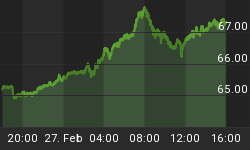Last year, Paul O'Neill in his book on his days as U.S. Treasury Secretary wrote that he had the TV business channel CNBC running all day in his office. There is nothing wrong with a Treasury Secretary observing the news, but he is the one who should be setting the news, not following it every minute of the day. His successor does neither, which is not particularly encouraging, either.
In the meantime, the Federal Reserve Bank system has been working on greater "transparency" with the public; their goal has been to communicate more effectively what their intentions are. However, it has become apparent that good intentions do not necessarily lead to good results. An ever larger section of the the Fed's meetings (as apparent from the FOMC minutes) are devoted to what the Fed believes how the public will perceive their statements.
There are two implications: first, it signals an ever growing influence of governor Ben Bernanke, who mentions at every occasion possible that interest rate policy is best set with words, that the right signals at the right time is the most effective way to manage the entire yield curve. Traditionally, central banks mostly control short-term interest rates, whereas rates for debt with longer maturities is set by the markets; Bernanke believes the entire yield curve can and should be managed. For now, Bernanke will leave his post as Fed governor and become Bush's chief economic advisor; we still believe Bush will appoint him as successor to Greenspan, but even if not, it is clear that he will continue to be highly influential in both monetary and fiscal policy.
The other implication is that those in charge of preserving our monetary system are now guided by their perception of how the markets will perceive them. This is a recipe for disaster: it is no different from stock analysts recommending a stock merely because it is attractively priced "relative to its peers," not because of some intrinsic value or potential; it is also no different from real estate brokers claiming that housing prices wil never go down because they "always" rise in the long-term. This time around, the Fed and the administration have artificially kept the consumer afloat in the post dot-com era (U.S. consumer spending never declined after the tech bubble burst), and it may well be a falling dollar that will deflate this one. If the yield curve is put into a corset, some other valve has to give. When managing a fragile psychology is more important than fundamentals, we are in trouble.
Greenspan is scared because he knows inflation is building up, but he cannot aggressively raise rates without sending an overly leveraged, and thus interest-rate sensitive economy into a downward spiral. The latest FOMC minutes claim that recent inflationary warning signs are only temporary. Average salaries, which decreased in 2004 for the first time in a decade, may be tame as corporations continue to accelerate their outsourcing as a result of global imbalances. But inflation is creeping up everyhwere, no longer just in the cost of healthcare and education. The only reason to state inflation is at worst a short-term issue is if one wants to have an excuse not to raise rates aggressively; Greenspan needs that excuse to keep the consumer afloat.
In meantime, the strains of the global imbalances are becoming more apparent. General Motors and Ford, the ultimate consumer-sensitive companies, can no longer reach their sales targets, and credit agencies are downgrading the quality of their debt. On the trade front, disputes are escalating, ranging from the Boeing/Airbus subsidy dispute with Europe to the escalating textile dispute with China. While the U.S. wants to re-impose quotas on textile imports from China, China is requiring technology firms to conduct their research and development in China if they want to sell to the Chinese government. For now, the U.S. may be winning the textile battle, but losing the high tech war. Trade wars can cause unstable systems to collapse, just as the depression in the 1930s was exacerbated through trade disputes. Setting economic policy based on public perception can only worsen the situation, taking us away from sound monetary policy.















